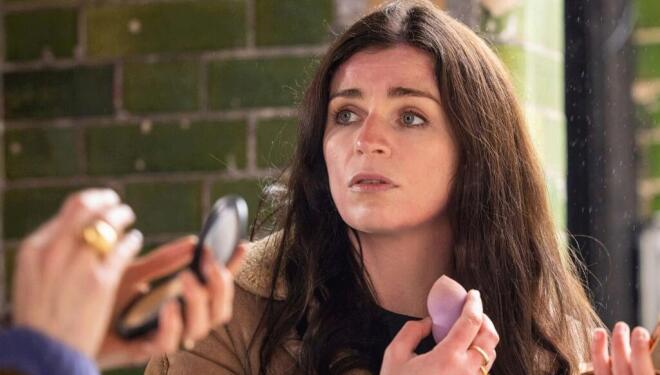
It's strange that the BBC is harbouring two seafaring thrillers in the same week: Tom Edge's submarine detective drama Vigil on Sunday nights, and now Andrew Haigh's whaling thriller The North Water on Fridays. Considering they're both claustrophobic shows set in or on the ocean, it begs the question: what's the BBC's obsession with water?
But The North Water plunges into grittier, more psychological territory, asking iceberg questions about human nature. Based on Ian McGuire's 2016 novel, the series captures a cold world, driven by money and amorality, set aboard a 19th-century whaling ship that’s meant to sink. Said vessel, the Volunteer, is setting course from Hull in 1859 to sail for the Arctic Circle. But the quietly money-hungry Captain Brownlee (an always great Stephen Graham) has more duplicitous plans in place.

Jack O'Connell and Stephen Graham as Patrick Sumner and Captain Brownlee. Photo: BBC
Starting with a quote from Arthur Schopenhauer, one of the most pessimistic philosophers in history, you can make out the series' sense of self-importance. But bizarrely, as the line appears, you also hear the sound of gruff, orgasmic grunting – that of Henry
Drax (Colin Farrell), a master harpooner with no conscience. This opening sets up a major theme that flows throughout the series: the conflict between primal instincts and intelligent, humanistic thought.
Drax is a hulking, unread beast of a man. In Farrell's absorbing, career-best performance, he seems to channel both Daniel Day-Lewis as the booming oil merchant from There Will Be Blood and Javier Bardem’s smiling psychopathy in No Country for Old Men. But those initial and unavoidable comparisons dwindle away eventually, Drax growing into his own, morbidly appealing monster.
If Drax is the dark heart of the series, the Volunteer’s surgeon Patrick Sumner (Jack O’Connell) is the beautiful mind. He’s a man of some wealth, reads Homer in his cabin and, despite journalling about his indifference towards the crew, has a bright moral soul.
Sumner boards for mysterious reasons, hinted at via dreams containing flashbacks within flashbacks – revisiting his time as a soldier stationed in India. The blunt contrast between his arrogantly affluent demeanour and the crew’s dirty, toxic and belligerent sensibilities is fascinating. And occasionally funny. Sumner often tries to prove his own manhood, and fails to match his shipmates’ strength and hedonism.
The ship also hosts a gruesome whodunnit involving one of the cabin boys, the paranoia simmering loudly among the crew. Haigh excels in these tense moments, especially as Drax is suspected and examined by Sumner.

Much of The North Water was shot on location in Svalbard. Photo: BBC
As the
drama pushes further north, the vast, frozen landscapes bite with both beauty and terror. The agoraphobia becomes as unnerving as the small and sickly spaces creaking aboard the Volunteer. It's even more effective considering much of the shoot was actually on location in Svalbard.
Like with the opening Schopenhauer quote, the hubris of the writing can be distracting. Each episode has a title card with a chapter heading, one of which is in Latin – speaking to the story’s novelistic roots. The dense, literary dialogue is easy to indulge, and often drops into discussions of morality, philosophy and theology. Although the series nurtures these respectably intelligent elements, it’s not as profound as it clearly wants to be.
Nevertheless, the efforts are engrossing and commendable. Haigh creates a purgatorial atmosphere, carved in ice – enriched by Nicolas Buldoc's sumptuous visuals, the harsh thrum of the sound design, and the near-experimental scratches and booms on Tim Hecker's immersive soundtrack. The North Water isn’t perfect, but leaves a stiff, cold breath down your back.
The North Water airs on Friday 10 September at 9:30pm on BBC Two. All episodes will be available on BBC iPlayer after the first broadcast.
| What | The North Water, BBC Two review |
| When |
10 Sep 21 – 10 Sep 22, ON BBC ONE |
| Price | £n/a |
| Website | Click here for more information |






